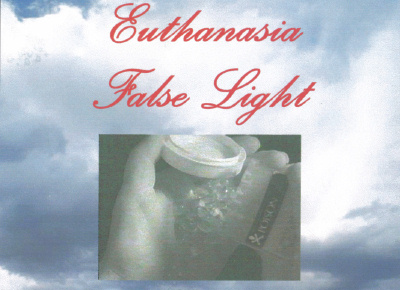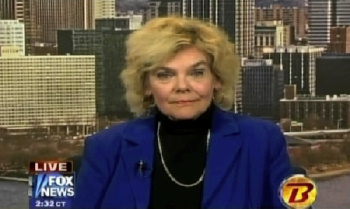There is now a concerted effort being made by doctor-prescribed suicide advocates to gain acceptance for what is called voluntarily stopping eating and drinking (VSED). Residents of assisted living facilities and others who are considered frail or disabled are being urged to consider this “option.”
You might wonder what this has to do with euthanasia by lethal injection and doctor-prescribed suicide.
The answer was given by a speaker at an international euthanasia conference some years ago. During her presentation, she promoted death by the removal of food and fluids. She went on to explain that once people see how painful death by starvation and dehydration is, then, “in the patient’s best interest,” they will accept the lethal injection.
(Source: Deadly Compassion, William Morrow and Company, pp. 94 and 267)
British doctors who have helped individuals starve and dehydrate themselves to death admit that the process is “horrific” but said there is no alternative in Britain as long as euthanasia remains illegal.
However, Compassion & Choices (formerly called the Hemlock Society) promotes starving and dehydrating oneself to death, even if they are not ill. The organization which is the leader in promoting the legalization of assisted suicide provides directions on VSED as a type of “end-of-life planning. It explains:
“Free will and the ability to choose are cornerstones of maintaining one’s quality of life and dignity in their final days. Many people struggle with the unrelieved suffering of a chronic or incurable and progressive disorder. Others may decide that they are simply ‘done’ after eight or nine decades of a fully lived life. A person may choose to control their own dying by making a conscious decision to refuse food and fluids of any kind…. (emphasis added)
Important Questions & Answers about VSED
Articles
“Give terminally ill option beyond dying of thirst”
(Albuquerque Journal — February 19, 2021)
Linda turned to the legal option of VSED….[T]he VSED process took 20 days with her experiencing vicious thirst….
“Nevada Legalizes Starving Incapacitated Patients”
(National Review — October 7, 2019)
“…the law allows people to order their future care givers to starve and dehydrate them to death”
“Dutch ‘euthanasia’ case sparks international furore”
(BioEdge — June 9, 2019)
The tragic death by dehydration of a 17-year-old Dutch girl was the subject of many conflicting stories. Noa Pothoven’s death was widely reported as “euthanasia.”
“Misinformation swirling around Dutch teenager’s death ignites debate over euthanasia”
(CNN- June 8, 2019)
Last week, after years of battling mental illness, Pothoven announced on Instagram that she had begun refusing all food and fluids.
“Euthanasia Zealots Push Starvation as ‘Death with Dignity'”
(The American Spectator — December 11, 2018)
Pushing VSED [Voluntarily Stopping Eating and Drinking] as a means of death and/or qualifying for assisted suicide/euthanasia is bad enough. But now activists have started a campaign to force caregivers to starve dementia patients — even when they willingly eat and drink.
“Has stopping eating and drinking become a path to assisted dying?”
(Policy Options — March 23, 2018)
Can patients, by stopping eating and drinking, make themselves meet the criteria for a “grievous and irremediable medical condition,” the requirement to access MAiD?”
At the end of February, Ms. S. voluntarily stopped eating and drinking, with palliative care support. Fourteen days later, [Dr.] Wiebe saw her again and concluded that “the significant malnutrition and dehydration were incompatible with continuing survival” and that she how met the standard for reasonable foreseeability.
“Is there any difference between euthanasia and palliated starvation?
(BioEdge — November 6, 2017)
While VSED does not involve an invasive or aggressive act like many other means of suicide, the authors write that “VSED should [nevertheless] be considered as a form of suicide….Doctors who assist patients in VSED — by encouraging them, or promising pain-relief if VSED is undertaken — are potentially instrumental in the deaths of the patients, as the suicide would not occur without them, and they share the patient’s intention of inducing death.
ANA Adopts New Recommendation on VSED
“Nutrition and Hydration at the End of Life”
(American Nurses Association — September 2017)
“People with decision-making capacity have the right to stop eating and drinking as a means of hastening death…Some people who choose VSED may not be imminently dying….
“Psychological, spiritual or existential suffering, as well as physical suffering, can lead to patient requests for hastened death. There is an extensive knowledge base to help manage the burden of most physical symptoms….
“Nurses who have an informed moral objection to either the initiation or withdrawal of nutrition or hydration should communicate their objections whenever possible, to provide safe alternative nursing care for patients and avoid concerns of patient abandonment.”
“Complexities of Choosing an End Game for Dementia”
(New York Times — January 19, 2015)
Article discusses using advance directives to order that the signer not receive food and fluids by mouth if he or she develops dementia.
“British right-to-die campaigner starves herself to death”
(Bioedge — October 25, 2014)
Jean Davies, 86, died after she stopped taking food and water. She did not have a terminal illness. In an interview with the Sunday Times, she described the process. “It is hell,” she said. Her daughter was asked why her mother persevered in carrying out her death. “I think it occurred to her after she started her course of action that it was something which could attract attention,” she said. “She sought publicity after her decision.”
More on United Kingdom
“Advance Directives, Dementia, and Withholding Food and Water by Mouth”
(Source: Hastings Center Report 44, no. 3 (2014): 23 37)
The authors argue, “If incompetent people do not lose their rights to refuse life-saving treatment, and if people when competent have just as strong a right to VSED as they do to refuse life-saving treatment, then people do not lose their right to voluntarily stopping eating and drinking when incompetent either. They only have to exercise it by advance directives.”
“A Traveler’s Final Story”
(Herald Tribune — March 23, 2014)
Sixteen days without a morsel of food. Sixteen days without a gulp of water….”[I]f someone asked me do do this again, I’d tell them I want no part of it,” says Helen. “I’d strongly suggest they look into all the reasons they want to leave — and then that they get some goddamn pills.”….”I don’t think Dorothy ever considered the burden you are putting on people by asking them to help.”….
“Old or Sick People Starve Yourselves!”
(National Review — July 24, 2013)
In the Journal of Medical Ethics, Julian Savulescu argues that doctors should help suicidal patients starve themselves to death. He means voluntary self starvation — also pushed in the euthanasia movement as VSED (voluntarily stopping eating and drinking).




